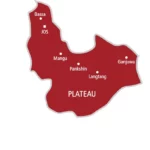As fast as they could, they continued jumping, dodging, posing, standing, running, stopping and peeping with their very sharp, penetrating, small eyes that could see objects from a long distance, especially if such objects are viewed by the monkeys as “intrusive”, “grange” or “foreign.” The leader of the group continued screaming “uum”, “uum” which is a sort of “danger alert” shouting to warn the others of an impending danger. “They are very clever; they think you are holding a gun and probably want to shoot them,” revealed John-Kennedy Nwachukwu, a guide who is also an attendant in the palace of the royal father of the Lagwa community, Eze Cosmas Onyeneke, the Ekwueme IV of Lagwa. The traditional ruler had asked John-Kennedy to take the reporter round the community so that he could see the animals and photograph them in their natural habitat.
Lagwa is in Aboh Mbaise Local Government Area of Imo State in the South East geo-political zone of Nigeria. Lagwa, which refers to the communities of Lagwa and Umunokwu, is made popular by the monkeys that have lived side by side with the natives for the past 300 years. The community is made up of seven villages, as Umuabazu, Umunoke, Umuokere, Ezido, Obo, Okwuta and Umuosi. Currently, Umunokwu is recognised as autonomous. Throughout Nigeria and some other African countries, monkeys and other wild animals are usually cruelly hunted, a development that makes them timid and hard to observe in their natural habitat.
However, the story is different in Lagwa community where monkeys are not just respected but have been preserved since the animals first settled there more than 300 years ago, according to the traditional ruler. In Lagwa, it is an abomination for one to harm, kill or eat the monkeys. And this cultural and traditional practice has, to a large extent, put the Lagwa community on the world map particularly since the community is known in the United States and England.
According to Lynn R. Baker, a scholar at the MacArthur Interdisciplinary Program on Global Change, Sustainability, and Justice at the University of Minnesota, USA, “Lagwa is recognised for providing a safe haven for monkeys. Because only three communities are known to protect the endangered Nigerian monkey in the whole of Nigeria, Lagwa is famous not only throughout Igboland and Nigeria, but also in other countries, such as the United States and England.” Genesis of Lagwa Monkeys:
Even before the human beings ever occupied the place known today as Lagwa, monkeys had been living there. Eze Onyeneke who spoke in an exclusive interview with our correspondent inside his palace, recalled the origin of the monkey-man friendly relationship in the area which dates back more than 300 years ago. “We had a forefather, the very first man who ever lived in Lagwa over 300 years ago; his name was Agwa. The man and his wife, called Agwawunma lived here in Lagwa. Our forefather, Agwa was a hunter and great farmer. Every morning, he would go hunting and farming,” recalled the royal father.
According to him, “on one occasion when his wife was heavily pregnant; Agwa went to farm to hunt for games; and later came back. Upon returning, the wife narrated to him how hunger wanted to kill her during his absence but that the monkeys jumping from one tree to the other, however, brought (dropped) different fruits to her; she ate the fruits and then the hunger ended. Agwa was very delighted after listening to his wife’s story.”
Eze Onyeneke also narrated, “Then another day, Agwa went to do his normal farm work and hunting. And the pregnant wife again became very hungry and it was only the animals (monkeys) that brought different types of fruits to the pregnant woman and she enjoyed the fruits which she ate and was well nourished. When he came back, Agwawunma, the pregnant wife told him how friendly and hospitable the monkeys were.”
The royal father said, “Henceforth, Agwa, the first man to live in Lagwa, pronounced that nobody in the community should harm or kill the animals (monkeys); that the animals which could provide food (fruits) for a hungry person are also like ordinary human beings, and therefore should never be killed or harmed. From that day, the monkeys began to live comfortably with our people and our people do not hurt or kill or eat the monkeys till the time I am speaking with you now. This is the genesis of Enwe Lagwa otherwise called monkey Lagwa. Enwe is Igbo word for monkey while Lagwa is our community. The existence of monkeys here made our community famous.”
The monkeys in Lagwa are considered a special and very rare breed that cannot be found in any other country, in the African, European, Asian or American continent. In her publication entitled, ENWE LAGWA: THE MONKEYS OF LAGWA which captures her study of the Lagwa monkey, Lynn R. Baker wrote, “the monkey that lives in Lagwa is called the Sclaters, or the “Nigerian” monkey (the scientific name is Cercopithecus sclateri). This monkey is found only in Nigeria and not in any other country. Moreover, this monkey occurs only in a small part of Nigeria: in Igboland and in Rivers, Bayelsa, and Akwa Ibom States. Of all the other types of primate species living in Nigeria, this particular monkey is the only one that cannot be found in any other country!”
Although the monkeys are admired and appreciated by many, there are some who think they are destructive and therefore should be completely eliminated from the community. Such people accuse the animals of destroying their farm crops which they (monkeys) eat to survive since they are also entitled to life. But the fact still remains that the monkeys have lived in the area long before the humans who now occupy the land. “Well, you know that in the past, we used to have thick forests but now those things no longer exist. These monkeys now are living in the houses and in the farms. But with that…you know the monkeys usually eat farm products (crops) such as pears, corn; they eat eggs. Some natives here are accusing the monkeys of destroying their farm products. But because of the tradition, most people now say the monkeys are our pride and we must keep them,”said Eze Onyeneke.
A native who didn’t want his name in print said, “the animals are destructive. They should be erased from the land of Lagwa. We suffer to plant crops but the monkeys do the harvesting for us; it is so painful.” Another indigene who said he is a pastor of a new generation church but did no want his name or that of his church published, said the monkeys are demons which certain people use to bewitch their enemies with in the community.
But the traditional ruler disagreed with the idea of labeling the harmless monkeys “evil” in order to kill them. He said if for any reason someone kills the monkey, tradition demands that the killer bury the animal the way human beings bury their own dead.
Eze Onyeneke said the monkey is not attached to any deity, shrine or water spirit and as such is not worshipped in any way by any man or woman in the community.
Mystery: One great mystery about the Lagwa monkey is that if it mistakenly enters into a neighbouring community where people try to attack and kill it, it would struggle to escape into the house of any of the Lagwa daughters married in the neighbouring community.
“One important thing to note is that if the monkeys cross the border and enter another community and the people there begin to attack them in order to kill them; what the animals will do is to try and escape into the house of any of our daughters who are married to that community. In such situation, that our daughter would protect them by locking the door after which she would release them when the attackers must have left. And the monkeys will continue their journey back to Lagwa. That is how they behave,” said the traditional ruler.
Another wonder or mystery about the animals is that even when any of the monkeys falls sick and dies, it usually worries the monkey family. In such situation, they would become sober while they make effort to scratch the earth with their sharp fingers and bury their dead. “If any of their members dies; they do not allow anybody to touch the corpse; they usually carry their dead and bury them by themselves. They would dig a hole with their fingers and bury their dead there,” explained the traditional ruler.
Yet another mystery is that if a man intentionally kills the monkey and refuses to bury it in line with cultural demands, such person may get his reward or punishment from nature (God). According to the royal father, “there was a particular man who killed one of the monkeys.He refused bluntly to perform the traditional rites for the animal he killed; he claimed he is a Christian. The community left him to his fate. When his pregnant wife eventually gave birth, the new born baby was like a monkey. They were hiding the child because they didn’t want people to know what happened to the family.”
Protection of the Lagwa monkeys:
Why should the monkeys be protected? Since the Nigerian monkey is not common and cruelly hunted, it is considered endangered by The World Conservation Union’s IUCN Red List of Threatened Species. But in Nigeria, Decree 11 of 1985 (currently in Cap. 108 LFN 1990) totally prohibits the killing and selling of this monkey.
As the monkeys kept screaming “uum”, “uum”, jumping and climbing and running on the tree trunks and branches, trying to shy away from the camera and “stranger”, even as some people want them totally exterminated from the Lagwa land, it would be proper to recall what God says in the Bible about man and animals. In fact, God warns against the destruction of nature and wild life. In Jeremiah 9:10-11, God said, “…God will weep and wail for the mountains and take up a lament concerning the desert pastures…The birds of the air have fled and the animals are gone…”



